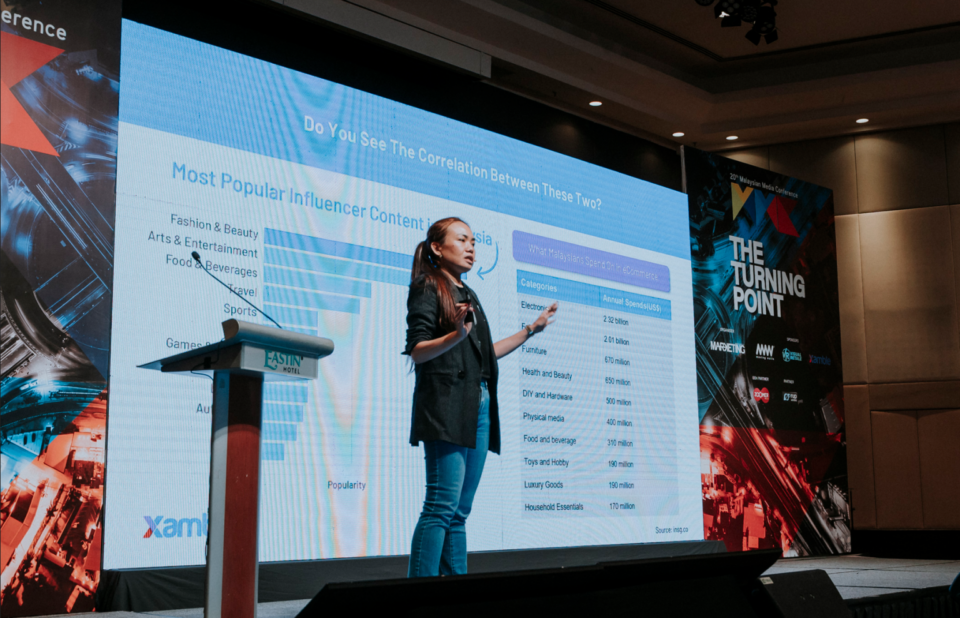
The Most Loved Raya Picks: Top Restaurants & Dishes Recommended by Our Community
28 Apr 2025
Tukar Minat Kepada Sumber Pendapatan Melalui Platform Pemasaran Pempengaruh Xamble Express
23 May 2025Kuala Lumpur-based Xamble Group Limited CEO Jason Thoe (centre) with Dutch Lady Milk Industries Head of Digital, Media & Insights Khoo Xing Jun (left) and Numinara.co general manager Ng Jack Chung (right).
Kuala Lumpur-based Xamble Group Limited CEO Jason Thoe (centre in pic) said that, with Malaysians spending increasingly more time on social media platforms, brands and retailers have started merging commerce with community, fundamentally transforming the consumer shopping experience.
“This growth underlines the instrumental role influencers play in shaping consumer purchasing behaviours in Malaysia,” said Thoe.
According to recent industry insights, social commerce platforms like TikTok Shop have seen significant growth, with TikTok Shop alone registering an 8% increase in 2024. While this may seem modest, it is highly significant when viewed against Southeast Asia’s projected e-commerce revenue of USD 113.9 billion (around RM540 billion) for the year, according to Statista .
“Influencer marketing has similarly expanded, rising by more than 16% highlighting the growing influence of creators in shaping purchasing decisions. In Malaysia, consumers increasingly seek product discovery and shopping experiences within the social platforms they trust, signalling a shift toward more authentic, community-led commerce,” said Thoe.
“Social commerce is redefining how Malaysians discover and buy products,” he added. “Consumers today are looking beyond products for authentic experiences and trusted recommendations that traditional advertising struggles to deliver.”
Brands leveraging social commerce effectively are those investing in genuine connections through micro-influencers and community-driven content, Thoe added.
He also emphasised that affiliate marketing is also becoming critical, with Shopify Malaysia reporting that 54% of marketers globally rank affiliate channels in their top three for customer acquisition.
“We anticipate a stronger shift towards even greater integration between commerce, entertainment, and social interaction,” said Thoe. “Platforms that seamlessly blend these elements will emerge as market leaders.”
A recent State of CX Malaysia 2024 report by CX Malaysia in collaboration with the Malaysia Digital Economy Corporation (MDEC) and Twimbit highlighted Malaysia’s Customer Experience (CX) Index at 3.61 out of 5.0, suggesting substantial room for improvement in consumer interactions and personalisation. These are critical components of successful social commerce strategies.
Smart and savvy brands that are ahead of the curve have already begun capitalising on this shift, said Thoe. A standout example is Dutch Lady Milk Industries, which successfully leveraged TikTok Live to forge deeper, more meaningful connections with its audience while accelerating online engagement.
Dutch Lady Milk Industries Head of Digital, Media & Insights Khoo Xing Jun said that by leaning into community-led content and empowering creators, the company was able to shift from traditional push messaging to real conversations with consumers. “Social commerce gave us the platform to build trust, relevance, and stronger affinity in a way that static content simply couldn’t.”
Indeed, for brands and retailers, embracing social commerce means more than just selling on social media platforms.
“It demands an evolved understanding of consumer engagement, community building and trust. Companies investing in influencer partnerships, live streaming events, shoppable videos and interactive social campaigns are positioned to capture significant growth,” said Thoe.
Gen Z and millennials are particularly active in shaping the future of social commerce with their preference for authenticity, value and community-driven experiences.
“Gen Z in particular expects brands to reflect their values, including sustainability, but without passing on extra costs. Both groups are highly digital, favouring platforms that offer seamless shopping journeys and real engagement over traditional sales tactics. For brands, this means delivering meaningful content and experiences that resonate beyond the product itself,” said Numinara.co general manager Ng Jack Chung (right in pic).
Looking ahead, the success of social commerce in Malaysia would hinge upon how well businesses can authentically connect with consumers through innovative, engaging content.
Thoe believes the opportunity is massive for brands that are willing to take risks and innovate.
“2025 is set to be the tipping point, solidifying social commerce as not just part of the e-commerce landscape, but central to it,” he concluded.
SOURCE : Link
State of social commerce in Malaysia 2025 — and why it matters more than ever
Social commerce in Malaysia is rapidly evolving from an emerging trend into a dominant force reshaping the landscape of online retail.Kuala Lumpur-based Xamble Group Limited CEO Jason Thoe (centre in pic) said that, with Malaysians spending increasingly more time on social media platforms, brands and retailers have started merging commerce with community, fundamentally transforming the consumer shopping experience.
“This growth underlines the instrumental role influencers play in shaping consumer purchasing behaviours in Malaysia,” said Thoe.
According to recent industry insights, social commerce platforms like TikTok Shop have seen significant growth, with TikTok Shop alone registering an 8% increase in 2024. While this may seem modest, it is highly significant when viewed against Southeast Asia’s projected e-commerce revenue of USD 113.9 billion (around RM540 billion) for the year, according to Statista .
“Influencer marketing has similarly expanded, rising by more than 16% highlighting the growing influence of creators in shaping purchasing decisions. In Malaysia, consumers increasingly seek product discovery and shopping experiences within the social platforms they trust, signalling a shift toward more authentic, community-led commerce,” said Thoe.
“Social commerce is redefining how Malaysians discover and buy products,” he added. “Consumers today are looking beyond products for authentic experiences and trusted recommendations that traditional advertising struggles to deliver.”
Brands leveraging social commerce effectively are those investing in genuine connections through micro-influencers and community-driven content, Thoe added.
He also emphasised that affiliate marketing is also becoming critical, with Shopify Malaysia reporting that 54% of marketers globally rank affiliate channels in their top three for customer acquisition.
“We anticipate a stronger shift towards even greater integration between commerce, entertainment, and social interaction,” said Thoe. “Platforms that seamlessly blend these elements will emerge as market leaders.”
A recent State of CX Malaysia 2024 report by CX Malaysia in collaboration with the Malaysia Digital Economy Corporation (MDEC) and Twimbit highlighted Malaysia’s Customer Experience (CX) Index at 3.61 out of 5.0, suggesting substantial room for improvement in consumer interactions and personalisation. These are critical components of successful social commerce strategies.
Smart and savvy brands that are ahead of the curve have already begun capitalising on this shift, said Thoe. A standout example is Dutch Lady Milk Industries, which successfully leveraged TikTok Live to forge deeper, more meaningful connections with its audience while accelerating online engagement.
Dutch Lady Milk Industries Head of Digital, Media & Insights Khoo Xing Jun said that by leaning into community-led content and empowering creators, the company was able to shift from traditional push messaging to real conversations with consumers. “Social commerce gave us the platform to build trust, relevance, and stronger affinity in a way that static content simply couldn’t.”
Indeed, for brands and retailers, embracing social commerce means more than just selling on social media platforms.
“It demands an evolved understanding of consumer engagement, community building and trust. Companies investing in influencer partnerships, live streaming events, shoppable videos and interactive social campaigns are positioned to capture significant growth,” said Thoe.
Gen Z and millennials are particularly active in shaping the future of social commerce with their preference for authenticity, value and community-driven experiences.
“Gen Z in particular expects brands to reflect their values, including sustainability, but without passing on extra costs. Both groups are highly digital, favouring platforms that offer seamless shopping journeys and real engagement over traditional sales tactics. For brands, this means delivering meaningful content and experiences that resonate beyond the product itself,” said Numinara.co general manager Ng Jack Chung (right in pic).
Looking ahead, the success of social commerce in Malaysia would hinge upon how well businesses can authentically connect with consumers through innovative, engaging content.
Thoe believes the opportunity is massive for brands that are willing to take risks and innovate.
“2025 is set to be the tipping point, solidifying social commerce as not just part of the e-commerce landscape, but central to it,” he concluded.
SOURCE : Link
Other Updates
23 May 2025



